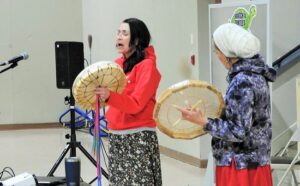Grandmothers giving voice to endangered turtles and more

By Leslie Knibbs
MISSISSAUGA #8 FIRST NATION – A recent information session and luncheon in Mississauga #8 First Nation (MFN) on Mar. 25 drew some 35 people to share concerns about a proposed quarry in the area. The event was hosted by KiiGaDoWaak Nookimisuk (Grandmother’s Council).
The Grandmothers Council from First Nations on the North Shore, as well as many other affected communities, are determined to put a stop to what will be the largest quarry in Ontario if Darien Aggregates receives final approval. The proposed site is on Traditional Territory and includes wetlands.
The Grandmothers recently released a statement outlining their concerns.
“The 115-hectare quarry proposed by Darien Aggregates is a ceremonial site on so-called Crown land in the township of North Shore. It would blast critical habitats for the population of Blanding’s turtles and other species at risk. The impacts of the quarry on hunting and harvesting would be devastating, cutting and blasting moose habitat, traditional medicinal plants, and tree species. Consultation has been held behind closed doors with little input from communities. The below-water table extraction will have impacts for generations. Rehabilitation of the quarry will take over 75 years to fill two man-made lakes artificially pumping from neighbouring water sources; up to 400 years to fill naturally. The land, waters, and people of this area are still dealing with health challenges from uranium mining, an abandoned Acid Plant. The Darien quarry would add further stress on the ecosystem, drinking water, and safety.”
Prior to the meeting, Elder Willie Pine from MFN and a founding member of the Traditional Elders Knowledge (TEK) in the area, gave an opening prayer. Jenifer Brousseau from Serpent River First Nation (SRFN) was emcee for the event; Brosseau began the meeting with an introduction and song. The luncheon meal was prepared by representatives from the MFN Women’s Shelter. During the lunch, Brousseau performed a song with April Lilley accompanying her on the drum.
Rhonda Kirby, a representative from the North Shore Environmental Resource Advocates (NSERA), put on a presentation, “Making an Informed Decision: Background and Potential Impacts of Quarry Development on Robinson-Huron Treaty Lands on the North Shore.” Speakers at the luncheon included members of the group Land and Water Defenders, Jenifer Brousseau (SRFN), Carol Shawan (SRFN), Ken Meawasige (SRFN Lands Committee), Conrad Bobiwash (MFN Lands Committee), and April Lilley (coordinator of Facebook page, Turtle Table Talks).
Brousseau, a resident of SRFN and Granddaughter of Alex Meawasige, conceivably best known as the host of the APTN’s program, Wild Archaeology, in a follow-up interview days after the meeting, perhaps best put into words what is at stake should this quarry go ahead.
“What concerns me most about this quarry is the potentially detrimental effects of its location in proximity to uranium tailings and seepage into the Serpent River watershed, which in turn flows into Lake Huron. Along with my concerns, in our community gatherings, we want to bring awareness in protecting endangered species in the area, not only turtles but other animals such as the myotis bat and the whip-poor-will. It is Anishinaabeg law and responsibility to be a guardian of the land and waters and to consider seven generations after ourselves. Many colonial decisions of the past were made without forethought, thinking with colonized economic gain. We have to learn from past mistakes and choose differently. Over 65 years later, we are cleaning the mess from the acid plant that was once in SRFN, burning holes in our moccasins, [and] our pow-wow grounds eventually needed to be relocated. We are also still dealing with the repercussions of touching the serpent’s eggs (mining uranium) and the sickness that doing so, brought to the lives of the people in the area.”
As the proposed site includes wetlands, home to many species in the water, on the land, and in the air, she continued, “It has been said that the wetlands are the kidneys of Mother Earth. As we deal with forestry and glyphosate in areas we once picked and utilized plants for food and medicine, we are now needing to be extra mindful of continuing our inherent ways of being – we are needing to become extra mindful of where we harvest foods and medicines. We don’t need an additional battle to preserve our way of life and traditional ways of being in the Robinson Huron Treaty territory.”
As part of the Aggregate Application process, Darien Aggregates was expected to consult with local First Nations: Mississauga #8, Serpent River, and Sagamok Anishnawbek, but also with Métis Nation of Ontario. This consultation process is not yet complete according to the Land and Water Defenders.
Brousseau and other concerned parties are not happy with the little consultation Darien had with Indigenous people on the proposed quarry.
“The minimal consultation with the Indigenous people of the area is apparent as we share information in our Land and Water Defenders Gatherings. Not enough community members even know the location of this proposed quarry and are in shock once they learn. We will continue to share with neighbouring communities the realities of the impact Darien will have on the location they have chosen to extract in the wetlands. We will continue to educate the upcoming generations as well. This is their future. What kind of legacy do we want to leave for them.”


